Batley and Spen: How Labour held on - and what it means for Sir Keir Starmer
- Published
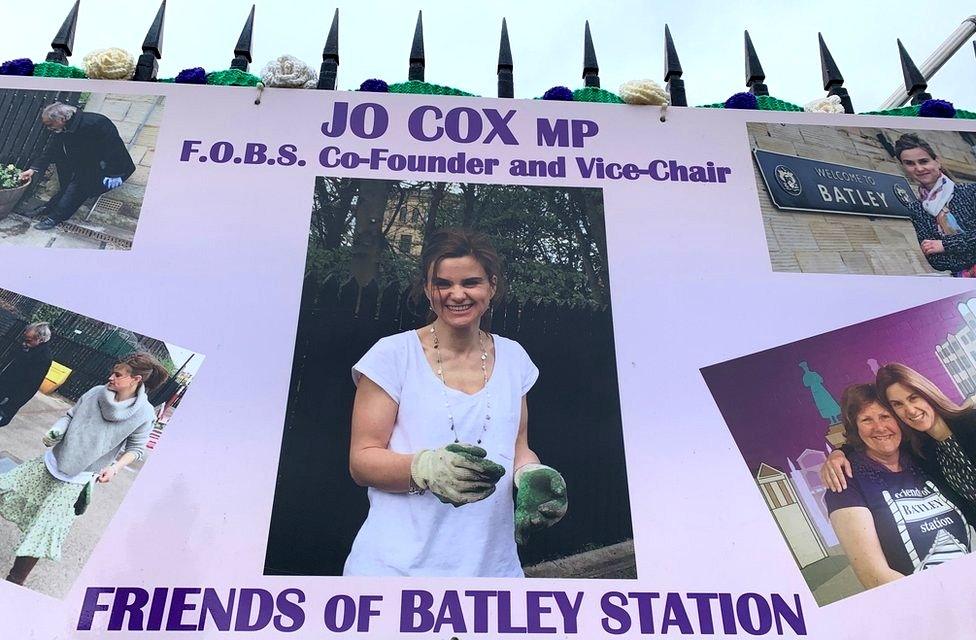
Jo Cox was killed in her constituency in 2016
Jo Cox is still held in high regard in Batley and Spen.
Alighting at Batley station, there is a huge picture of her, helping volunteers clean up the platforms.
The Labour MP's murder in nearby Birstall, in 2016, shocked the community.
Her sister Kim Leadbeater is now the MP for the constituency, but her victory was far from guaranteed.
Labour strategists were worried that rival candidate George Galloway would successfully sway South Asian voters, in particular, to lodge a protest vote, which they feared would have handed victory to the Conservatives.
Mr Galloway amplified and played back to Muslim voters their concerns: that the Labour leadership had not spoken up enough for Palestinians during the recent hostilities in Gaza, and had not stood up for Kashmiris' aspirations for self-determination.
Labour strategists also knew that the second defeat at a by-election in as many months - following the loss of Hartlepool - would inevitably call in to question Sir Keir Starmer's leadership - a scenario they wanted to avoid at all costs.
Leadership questions
The Batley and Spen result will take some pressure off Sir Keir.
The atmosphere in Labour circles at Westminster since May's local elections has been febrile.

Sir Keir hit the campaign trail to back Kim Leadbeater
Some Labour MPs fear things can only get worse - that more seats that were once safe are at risk.
There was a swing of nearly 3% from Labour to the Conservatives in Batley and Spen - if a similar swing was reproduced nationally, at a general election, Labour would have lost 11 seats.
Labour know their party's problems go deeper than the question of leadership - but preparations were being made for a worse result in Batley and Spen.
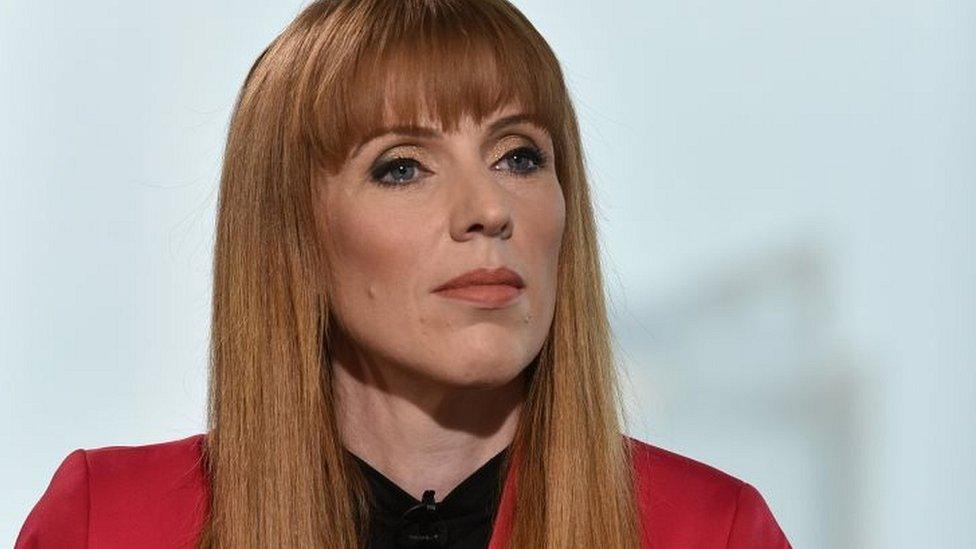
Angela Rayner did not sanction moves by her supporters, her aides say
Some MPs on the party's left say they were being sounded out by supporters of deputy leader Angela Rayner, who were testing the level of backing for a leadership bid. Her aides say this was not officially sanctioned.
It's unlikely that putsch will now come to shove. A leading MP on the left said: "Angela is the real loser from this result."
Discussions had also been taking place about freeing up a seat for Andy Burnham, to allow the Manchester Metro Mayor to return to Westminster, according to one insider, although Mr Burnham himself was not involved in these moves.
'Changing the party'
One shadow minister told me he viewed Mr Burnham as a possible leadership option, but he would wait to see how Sir Keir fought back over the coming months.
If the party was "in the same place next Spring", and with the prospect of a 2023 election, "we may have to act," he told me.
Influential supporters and advisers to Sir Keir concede he now has to do more to convince the party that he is an agent of change.
One of them told me: "He is going to have a rocky time but he needs to come out fighting.
"The Labour brand is the problem. People are not yet ready to look again at Labour - he must commit himself, we must commit ourselves, to changing the party."
Labour sources say Sir Keir will, effectively, relaunch his leadership on Monday - with a "bold address" to the party's MPs and peers.
But he will need to redouble efforts to make an impression with the voters as well as his own politicians.

So how did Labour hold on in Batley and Spen?
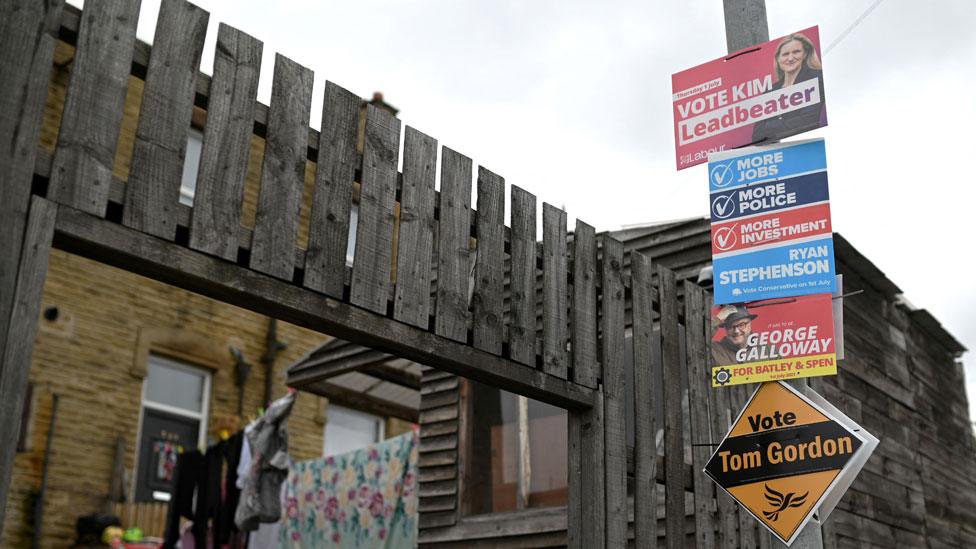
It was a closely-fought by-election
I visited Batley before polling day to look at the candidates' campaign tactics - and how they were being received.
This by-election was always going to be a major challenge for Labour. A Brexit-supporting independent candidate, Paul Halloran, got 6,432 votes at the 2019 general election. Labour had a majority of 3,525.
So, as the Americans would say: do the math. With Mr Halloran opting not to stand at the by-election, the Conservatives were always the most likely beneficiaries.
Labour saw a narrow road to victory - their task was to retain as many older, usually loyal, South Asian voters as possible by convincing them that a vote for George Galloway was in effect a vote for a Conservative MP.
They also sought to convince as many former Labour voters who defected to the Conservatives that Kim Leadbeater was more of a community champion than a conventional politician.
'Local candidate'
Labour was helped by the fact that Brexit was no longer a topic of heated doorstep discussions. The party may also have been aided by Matt Hancock's resignation, although campaigners say the former health secretary's Covid rule-breaking was rarely raised by voters. Instead, they fought a "local campaign on local issues".
Kim Leadbeater was promoted as the only "local candidate" and her Conservative opponent, Ryan Stephenson, as an outsider, despite being a councillor in Leeds, less than a 15 minute train journey away.
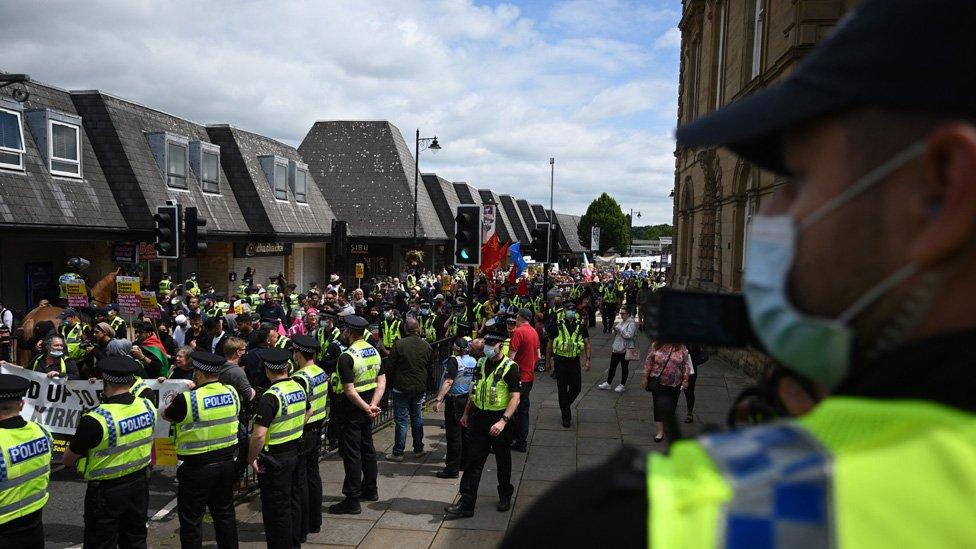
Batley was the scene of protest marches during the campaign
Labour sought not just to win back Conservative defectors but to squeeze the small but potentially vital Liberal Democrat vote.
Kim Leadbeater opposed the building of an Amazon warehouse on farmland in Cleckheaton, which has two Lib Dem councillors, arguing that green spaces should not be traded for jobs.
Concerns over building on green spaces helped the Lib Dems overturn a large Conservative majority in last month's Chesham and Amersham by-election.
Labour were also fortunate that the Green Party candidate withdrew when historic, inappropriate tweets came to wider public attention.
Labour also took a very targeted approach to campaigning, with a series of newsletters tailor-made for different towns in the constituency.
The pothole problem
So, the The Batley Local had Ms Leadbeater opposing fly-tipping, whereas the Heckmondwike Local trumpets a local council success - the building of the Spen Valley Leisure centre.
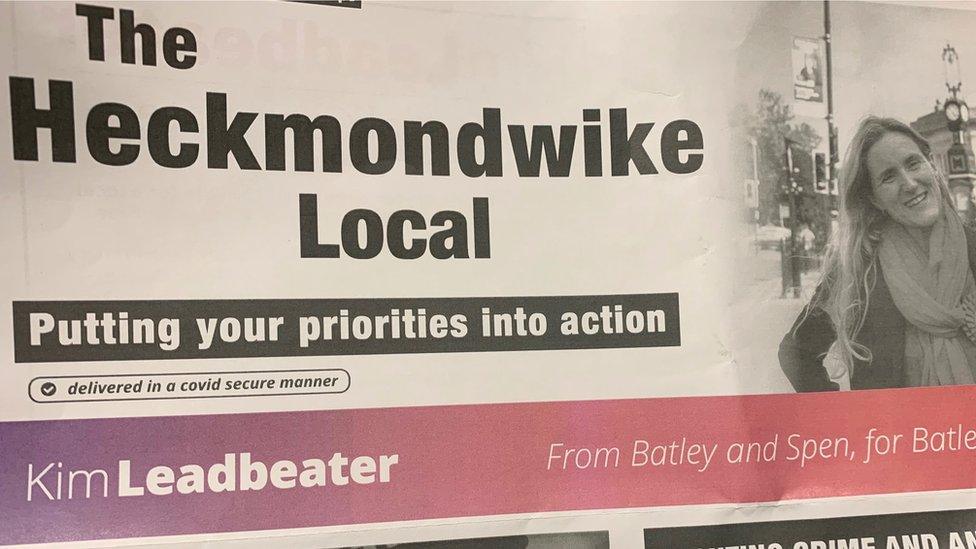
Labour targeted local towns with tailor-made messages
Labour insiders deny they were saying different things to different people - a common Labour complaint about Lib Dem by-election tactics - just that they were responding to local concerns.
And local concerns, in particular the state of the roads, were a major factor.
It is hard to believe that a pothole in Yorkshire had the potential to hole the Labour leadership at Westminster below the waterline - but Labour's campaigners acknowledged that this issue - along with traffic congestion - was raised more than any other.
Households in the hilly area stretching from Perseverance Terrace down the main Dewsbury Road in Batley mainly come from a South Asian background - and they had been pressing for the roads to be resurfaced for years, they told me.
When the by-election was called, some of the streets were suddenly improved - a development that was met with cynicism rather than gratitude, among the local residents.
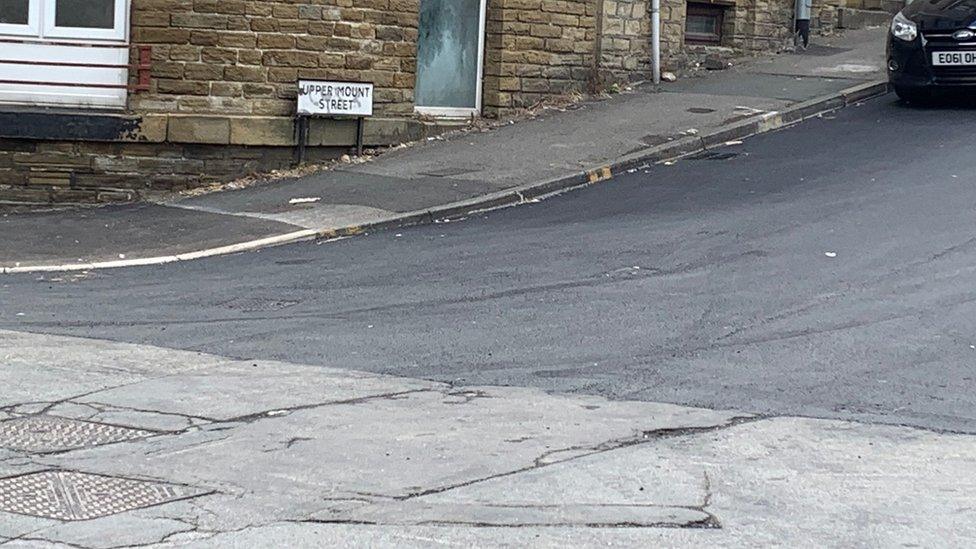
Some voters were suspicious when roads were repaired by the council
Indeed, scepticism towards the local, Labour-led, Kirklees Council was so widespread, it was even getting the blame for events outside its control.
The Conservatives expected to get flak for the closure of the local police station but Tory organisers admitted that it was helpful that George Galloway also seemed happier to put the council not the government in the frame.
Labour had to work hard convince people that it was years of central government, Conservative austerity that was to blame - not neglect by the local council.
And Labour pledged to build a new police station.
The Galloway factor
Labour tried to counter George Galloway's presence in the South Asian community in a number of ways, including - at the most basic - ensuring MPs from an Asian background were very visible on the streets.
Labour supporters from that community sent WhatsApp messages to friends in Batley and Spen pointing out what they saw as Mr Galloway's poor track record as an MP in nearby Bradford - where he defeated Labour at a by-election in 2012.

George Galloway mounted a high-profile campaign
Some of this seemed to strike a chord with older Muslim voters I spoke to before polling day.
"George Galloway is very good at chatting," Yunis, a businessman, told me.
"But, I ask, is he going to do the job? We have issues with Palestine but voting for him is a gamble."
Muzainah, a student, belongs to a generation that seems far less tribally loyal to Labour.
She said: "Palestine is important but I am looking at all aspects of this - and George is very good with the community."
Leaflet-after-Labour-leaflet stressed that "this was a two horse race". In other words, vote Galloway, get Boris Johnson's man.
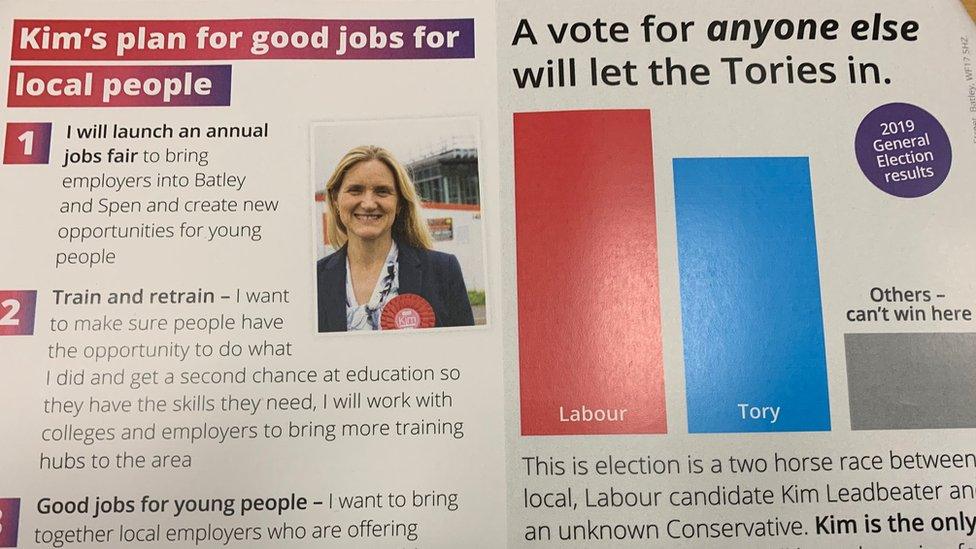
Labour tried to use the threat of the Tories getting in
But one leaflet in particular stirred controversy within the Labour Party - it showed a picture of Boris Johnson with the Indian Prime Minister Narendra Modi, a Hindu - in an apparent attempt to dog-whistle to Muslim voters.
A spokesman for Keir Starmer defended the leaflet by saying it suggested to voters that the election of a Conservative MP would boost Boris Johnson, who hadn't spoken out on human rights abuses in Kashmir.
And a letter from Kim Leadbeater stressed her and her party's commitment to a "two state solution" - a Palestinian state alongside Israel - in the Middle East.
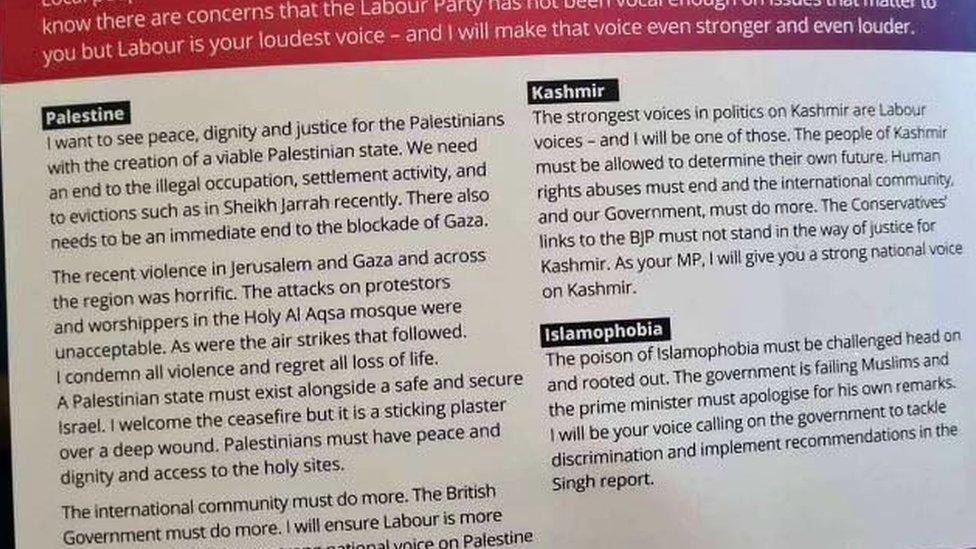
Labour's message on its Middle East policy
Dirty tricks
Labour of course say they were the real victims of dirty tricks - from their candidate being harangued in the street by an opponent of gay rights, to fake leaflets purporting to be from trade unions - the provenance of which has not been established - suggesting that the party would not stand up for the concerns of white working class voters.
The Conservative plan was to stay above the fray and the mud-slinging and try to give as few reasons to the electorate as possible to vote actively against them.
Their candidate, Ryan Stephenson, wasn't invisible but his presence did feel ethereal and perhaps he needed to be more vocal when up against a passionate Labour candidate.
Internal Conservative critics believe a bolder campaign may have produced a better result. Many of the attack lines against Labour were left to George Galloway to deliver.
And Labour fought a more impressive "ground war" than their political enemies, with activists saying the "get out the vote" operation was run with military precision and more than 400 footsoldiers.
Was Starmer a factor?
Going door-to-door, I found very little hostility to Sir Keir Starmer personally.
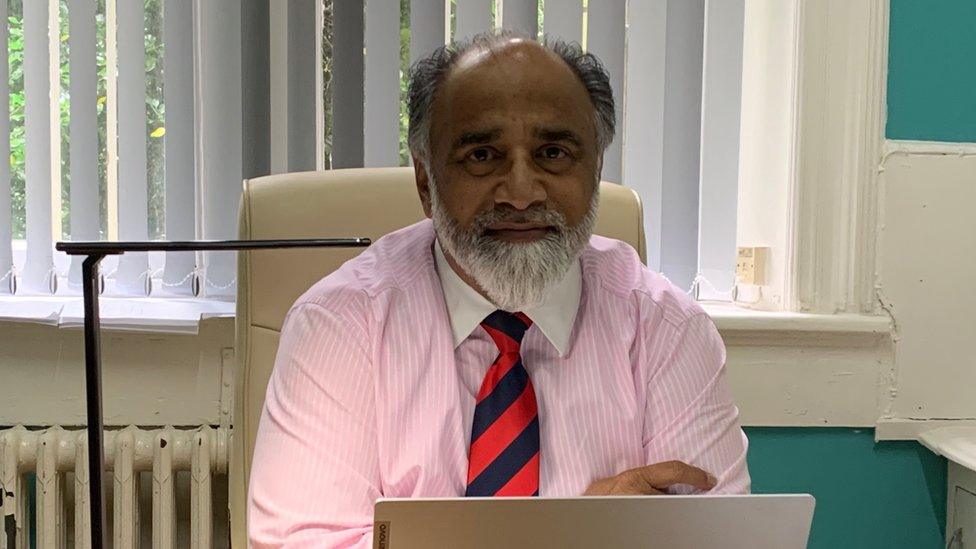
Nadeem Raja wanted to send a message to Labour
But for some in the South Asian community, the prospect of unseating the Labour leader was a central motivating factor in the campaign
Nadeem Raja runs the Indian Muslim Welfare Society and said he had supported Labour since moving to the UK from Pakistan in 1993 - but this time he had backed the Galloway campaign.
'I am not saying Jeremy Corbyn was an angel but his whole life it was clear what he stands for, his whole moral current.
"Our perception of Keir Starmer is he has no policies, no drive. He sits on the fence."
He added: "We need to send a message to the Labour leadership, and other parties that Muslim votes matter."
Sir Keir clearly needs to improve relations with voters who feel alienated - but he has faced down an explicit attempt by George Galloway and some of his supporters to unseat him.
A Labour source said that the contest was presented as a referendum on Sir Keir's leadership - and he won.
In some ways, the Batley and Spen result should be unspectacular - simply holding a seat that had been Labour since 1997.
But given the recent disappointing results in the English local elections - as well as Hartlepool - expectations were so low that simply holding on feels more like a gain.